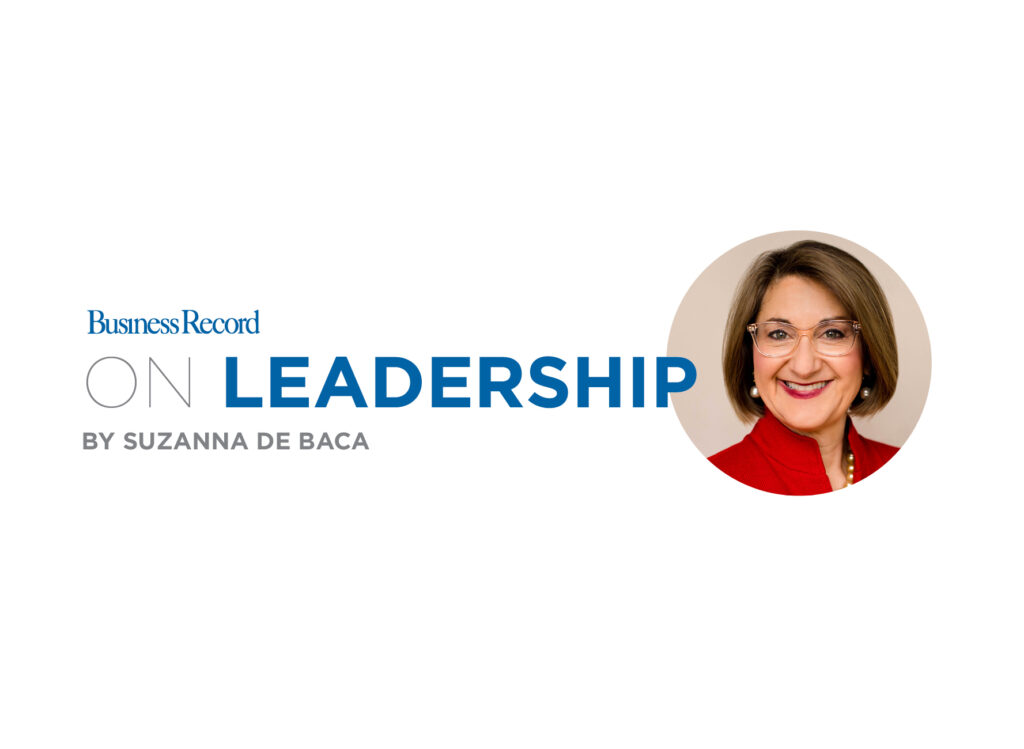On Leadership: Strategic career advancement in a changing world
Why building your own path matters more than waiting for a promotion

When I started out in the working world, the path to advancement felt linear. You got some education or training, joined a company, did good work, and waited for a promotion or advancement. For the most part, the employer determined each next step.
“This arrangement is no longer working for either employees or employers,” writes management expert Bob Nelson in HR Executive magazine.
Nelson suggests that traditional career ladders are being replaced by flexible “career maps.” Growth is no longer predictable or employer-directed, so when progress slows, employees are less willing to wait. They seek purpose, adaptability and development that aligns with their own values and strengths. As a result, to keep top talent, companies must shift from rigid roles and outdated promotions to real-time learning, authentic engagement and offer room to grow.
A recent Harvard Business Review article, “Ten Ways to Supercharge Your Career,” supports this shift. Authors Alison Beard and Curt Nickisch report that more than half of workers will need to learn new skills within the next year to stay competitive, yet most feel unprepared. This growing need for adaptability highlights the urgency of ongoing development.
Hard skills are still critical, especially in fast-changing fields. But soft skills often lag behind. A recent Forbes article called “Go or Grow” notes that while 97% of employers consider communication, leadership, and adaptability essential, only 31% offer training in these areas.
To close this gap, learning must become continuous and flexible. In addition to traditional instruction, asynchronous online courses, microlearning, coaching and on-demand options, empower individuals to grow without waiting for a formal program to begin.
Career resilience means preparing for change before it happens. Instead of waiting for a title, professionals should define their values, clarify what matters – such as remote work or meaningful impact – and pay attention to what energizes them. The Harvard Business Review article encourages workers to revisit career goals quarterly, treat learning as a habit and prepare for opportunities before they appear.
Career development does not live in HR forms or annual reviews. It happens in real conversations. According to the Forbes piece, regular career discussions between leaders and team members are among the most effective ways to foster engagement and growth. Yet many managers hesitate, unsure what to say or offer, especially if there is not an open opportunity at hand. But employees want to feel seen and supported. Even when promotions are not immediately available, asking about goals, interests, and values can create movement and direction. For employees, turning those conversations into action requires a clear and intentional approach to growth.
A strong strategy for career advancement today includes:
- Self-reflection and clear goal-setting
- Development of both hard and soft skills
- Building a strong and authentic professional network
- Seeking mentorship and sponsorship
- Proactively managing your career path with ownership and initiative
Career growth today is not a ladder to climb but an ongoing journey, a path to create. Employees who take ownership of their development will open new doors. And leaders who support that growth will help shape a workplace ready for the future.
I reached out to local leaders and asked for advice on strategic career development in a changing world.

Alan Feirer, owner, trainer and consultant, Group Dynamic
I hear this from people leaders a lot: “I have team members who think they deserve to move up, but they’re not showing the skills or initiative it takes to get there.” And from those same leaders: “I don’t have time to spell everything out – I don’t want to micromanage.”
At the same time, I see employees attending development programs or reading leadership books, but never looping in their managers. They don’t say, “Here’s what I’m working on. Will you hold me accountable?”
The solution is two-sided. Leaders need to clearly communicate what advancement looks like – not just assume people know. And aspiring professionals need to take ownership of their growth and invite feedback. It’s not just about learning new skills; it’s about applying them in the open, with support and accountability. That’s what keeps careers moving forward, increases engagement for both the leader and report, and builds interpersonal trust.

David Leto, president and CEO, Palmer Group
In a world increasingly driven by automation, AI and digital tools, it’s easy to overlook the value of genuine human connection. While technology enhances productivity, relationships drive careers. Professionals must have the ability to connect and build genuine relationships with those they work with and with those in the community to truly succeed long-term. As technical skills become increasingly more common, emotional intelligence, communication and building deep connections are what sets professionals apart. Soft skills like empathy, adaptability and active listening are no longer optional; they are essential. Be genuine, let others know you care, add value without seeking something in return, build relationships, then put in the work and take satisfaction in knowing you are making an impact. Remember, while technology can positively impact productivity, relationships will define your legacy.

Matthew Mitchell, CEO and partner, Bâton Global
In today’s fast-moving environment, career advancement requires more than experience … it demands authenticity, vision and purposeful action. Top performers don’t just adapt, they anticipate, align and lead others through change. They build authentic relationships that accelerate impact, and continually strengthen skills needed to thrive in an evolving world.
The future of work is human – highly collaborative and complex. What sets leaders apart is their ability to lead with empathy, stay curious, ask better questions and make decisions that are aligned with long-term purpose. Those who operate with clarity and intention don’t just stay relevant … they create what’s next.
This reflects how we at Bâton Global approach our own work – grounded in empathy, informed by strategic thinking and driven by a commitment to service and growth.

Robert Vedral, vistage chair, Vistage Worldwide
A key mindset for a professional is to have a “growth mindset.” Do not accept things as they are with a “fixed mindset,” but examine the possibilities for growth.
Utilize your skills and also those of the entire team to put forth comprehensive strategies for success. Create a culture of contribution and inquiry.
Skills, in my opinion, must be constantly honed in order to avoid stagnation. The attributes a professional, especially in a leadership position, should exhibit include seeking others perspectives, listening with intent and purpose, being a learner, mentor and being coachable. Also, leaders must be humble and authentic.
In a world of ever-changing technological capabilities, it is still the strength of the human connection that is critical and will prevail.

Suzanna de Baca
Suzanna de Baca is a columnist for Business Record, CEO of Story Board Advisors and former CEO of BPC. Story Board Advisors provides strategic guidance and coaching for CEOs, boards of directors and family businesses. You can reach Suzanna at sdebaca@storyboardadvisors.com and follow her writing on leadership at: https://suzannadebacacoach.substack.com.






